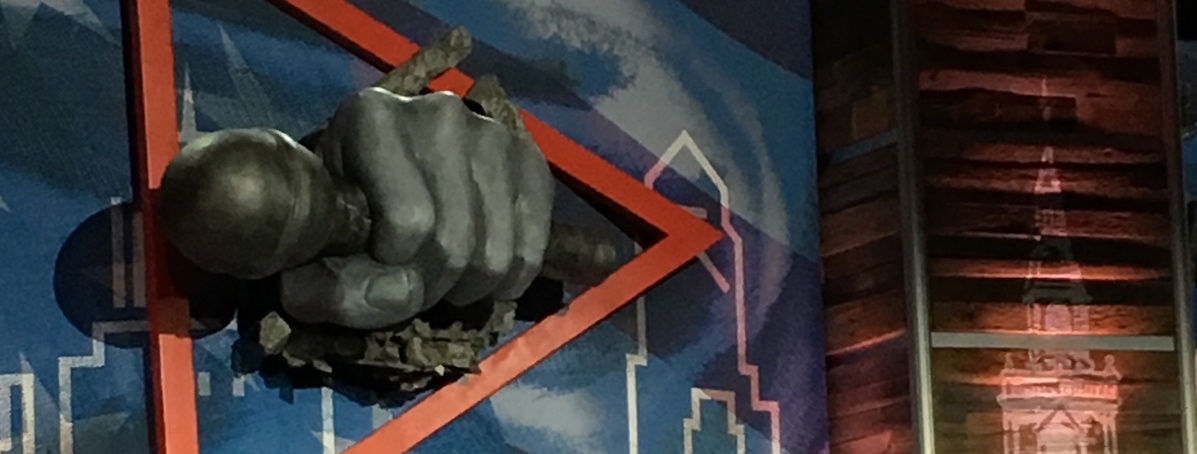Finding a Voice at Podcast Movement 2018
Friday, August 3, 2018

I started podcasting in 2007, but until late April of this year, I hadn't launched one of my own.
Now that I'm 13 episodes in, I've experienced many of the ups and downs anyone does during the early phase of a new pod adventure.
It's a ton of work to produce and post a new 30-minute (or longer) episode every week or two, and, on top of that there are two fundamental questions that continue to vex me:
• What is the central idea behind my podcast?
• What sort of voice does my podcast have?
While I've thought about this quite a lot, I haven't quite locked down the answers.
But that hasn't stopped me from doing the podcast.
It was perfect timing, then, to find myself in Philadelphia last week for the Podcast Movement 2018 conference, which, among other things, forced me to really dig into these questions.
Mostly, it's voice that I've been thinking about. Not, of course, the way your physiology produces a particular sound from your mouth, such as what one friend calls my "beefy baritone."
Instead, it's about your character, your authentic identity.
Before the conference, friends, family, and other listeners seemed to like the Media Narrative, but some had told me that they wanted me to put more of myself into it. They liked the conversations with my guests, but they wanted to know more about my personal connection to these conversations.
Step one, I decided, was to create a solo episode, recorded on my last full day in Philly, a thirteen-minute monologue that focused on my own story, as well as the questions above.
I wouldn't have had the focus to produce that episode were it not for the people I met and the speakers I heard at Podcast Movement. Below are highlights, loosely organized into a few conceptual groupings:
Voice and Narrative
Matt Mahr - The Dear Mattie Show
Describing his own podcast as a combination of comedy, storytelling, and advice, Mahr made a case for the power of telling real stories about oneself, arguing if you do that in a podcast, people will care more about the enterprise. He built his case by citing the Marshall Ganz philosophy of public narrative. I leaned on this idea heavily for the episode embedded above.
Tracey Goodwin - Captivate the Room
Goodwin talked about the importance of "vocal variety," that a podcaster—or any speaker—can best express themselves by employing five different characteristics of speech, employing them to varying degrees at different moments, "playing" your voice like a conductor guides an orchestra:
- Shades of volume - loud/soft
- Shades of speed - fast/slow
- Playing with pitch and melody
- Elongation - extending a word
- Pausing - the "most powerful" tool, she said.
I found this to be a very helpful breakdown, not only because it gives podcasters a way of analyzing what they are or are not doing, but because these elements feel so connected to musical parameters of expression. It's not about altering your voice simply for variety, but to communicate certain emotions on the way to creating a journey for listeners.
Aaron Mahnke - Lore
Few podcasters have the voice and narrative thing down better than Mahnke, whose wildly successful podcast and growing media empire features nonfiction storytelling on the "darker side of history." But my big takeaway from his session stemmed from what he had to say about podcast analytics. "Stats are your friend. Know your product well," he said, urging podcasters to look carefully at each episode's listens over time, when people stop listening during an episode, and the geography of your listenership. This information, Mahnke said, will help guide you toward making a better show.
The Podcast Introduction
Dave Jackson - School of Podcasting and Jeff Brown - Read to Lead
These two giants of podcasting provided a cogent breakdown of how to best structure and produce the first 60 seconds of an episode. They recommend something like this:
- Episode # and name of your podcast. Seems pretty obvious, but until this latest episode, I hadn't started numbering the episodes. Also, begin dry, with no music, they suggested.
- Influence and identity. Who are you and why should we listen? Perhaps include a testimonial, maybe even an actual guest quote from an earlier episode.
- Motivate. Music kicks in as you provide something that hooks listeners, like a pithy soundbite from the current episode, one that can be understood as a standalone piece of audio.
- Worldview statement. Your why, how, and goal. Where are you coming from and what are you trying to achieve?
- Foreshadowing. Should answer the question for the listener, "What am I in for in this episode?" Tease the content. Tell them what you're going to talk to your guest about, and make your listener feel like they're going to be right there with you as you have that conversation.
All of this makes complete sense to me, and I'm going to try to implement it in my next episode.
The Podcasting Industry and Other Tidbits
Tom Webster - Edison Research
Webster is a senior VP at Edison, which is the leader in tracking the size, growth, and other particulars of podcasting. There are a lot of encouraging numbers in Edison's latest report, so click through on the link above for some of it. But Webster also provided some helpful insights on the creative side of things. "What is it that ONLY you can say through your podcast?" he said. Once you answer that, then you're ready to build your show. Whoops. Two of my favorite quotes from this one: "Two guys talking about the Cubs is not a show." And... "...we need more high-quality crap...", which is, I think, a tongue-in-cheek encouragement to make stuff that connects with audiences the way some reality TV shows do.
Podcast Hall of Fame - 2018 Inductees
I had no idea there was such a thing. Move over, Babe Ruth. This was much more fun than any baseball HoF highlights I've seen. There was a lot of talk about the "early days of podcasting." Most of the inductees had first jumped in around early 2005, and have built huge followings, but all seemed like pretty regular people. One thing that became clear as I heard them talk and later listened to their podcasts: These people all have clear podcasting missions and distinctive voices. They collectively seemed to be telling the rest of us, "Be brave enough to do your own thing."
Rob Walch - Podcast 411
Walch's talk warned about the B.S. that appears in the form of most podcast marketing advice, but he touched on a wide range of issues. As a Libsyn VP and a long-time podcasting vet, the guy knows his stuff, and wasn't afraid to take contrarian stances on a few issues, such as length of show. "Don't worry about it," he said. "There's no too long, only too boring." Also, use official banner and logos for Apple, Downcast, etc. on your website - these companies like this and it could help drive traffic. I am going to rewatch his talk, because it was filled with on-target advice, from the meaty to the mundane.
I was fortunate to meet several key people, such as Podcast Movement cofounder Gary Leland; Happier host Gretchen Rubin, who was there strictly as an attendee; and podwatcher, podcaster, and industry guru James Cridland, who, among other things, issues an excellent daily podcasting newsletter, Podnews.
In one of this week's Podnews issues, he provided a list of articles about this year's Podcast Movement. Among them was a series of informative @wils_writes Twitter threads. One of Williams's threads provided play-by-play of a session on legal issues in podcasting. Follow Williams and sign up for Cridland's missives. And go to Podcast Movement if you're into audio. Money and time well spent.
On my episode #13 page, you'll find links to podcasts by several other cool producers I met at PM18.






